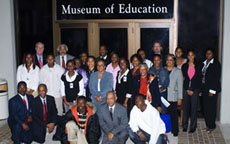

Teachers and Curriculum Development “The teachers inspired all of us, and they encouraged me to write—and write I did. This school changed my life.” Augustus Colson “The teachers would visit our homes and would become part of our extended family. Our parents would come to expect and depend upon the teachers to keep them abreast of what was going on at school, and the parents would do their best to continue this at home.” |
|||||||||||||||||||||||||
|
|||||||||||||||||||||||||
“Our teachers would talk to us about what we read, and ‘the keeper of books,’ Gladys W. Anderson, our librarian, handled those books like they were her babies. The library was an integral part of the school and of the curriculum. English teachers would set a time for us—elementary and secondary students—to go to the library. It was exciting for us, especially elementary children, to go to the library, to be around all of these materials, and to choose what we wanted to read. There were high school students who would read to younger students. It was a special place. Of course, there were many homes that didn’t have any books or magazines.” Lucille C. Alexander |
 Lucille C. Alexander |
||||||||||||||||||||||||
|
|||||||||||||||||||||||||
|
 “The librarian, Gladys W. Anderson, inspired me. I loved to read before I entered Lincoln High School. But when we went there, we read and read, and she was so sincere about helping us.” Lucille Brown |
||||||||||||||||||||||||
| “The program here is in the beginning stages. It is developing around three English teachers and a librarian. The program aims to promote growth in ability to find information, ability to get meaning from written passages and ability to get pleasure and satisfaction from a variety of reading sources.” Secondary School Study Catalog |
|||||||||||||||||||||||||
|
|||||||||||||||||||||||||
|
|
||||||||||||||||||||||||
|
|||||||||||||||||||||||||
|
 Charles Rollins |
||||||||||||||||||||||||
 |
“If it were not for Lincoln, I would never have gone to college. Mr. Porter and the Lincoln teachers guided and inspired me and prepared me to become a science teacher. They taught me how I should treat children -- that stayed with me throughout my career as a teacher. I learned from the Lincoln teachers the importance of teaching the whole child, touching the child at every level, and how to care for others.” |
||||||||||||||||||||||||
|
 Harry Nims |
||||||||||||||||||||||||
|
|||||||||||||||||||||||||
“The teachers were like surrogate parents. They were always concerned about what we were doing, what we were going to do, and what we were going to be. Mr. [Ray] Yarn would tell us ‘you can do anything in God’s world if you want to do it badly enough.’ I never forgot that. If we made up our minds to do something, we did it. Those were the real lessons that were taught to us by the Lincoln teachers.” Hazel M. Brown |
 Hazel M. Brown |
||||||||||||||||||||||||

an institutional member of the International Coalition of Sites of Conscience
Museumofed@gmail.com










